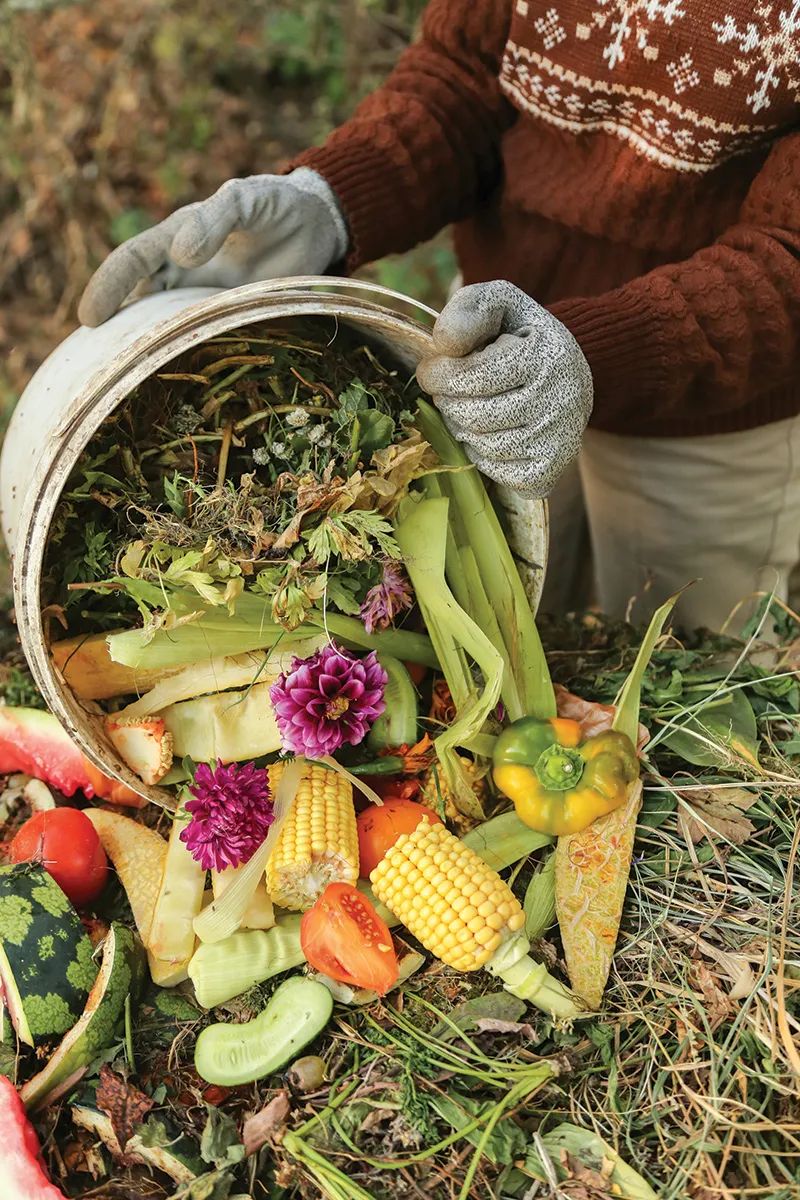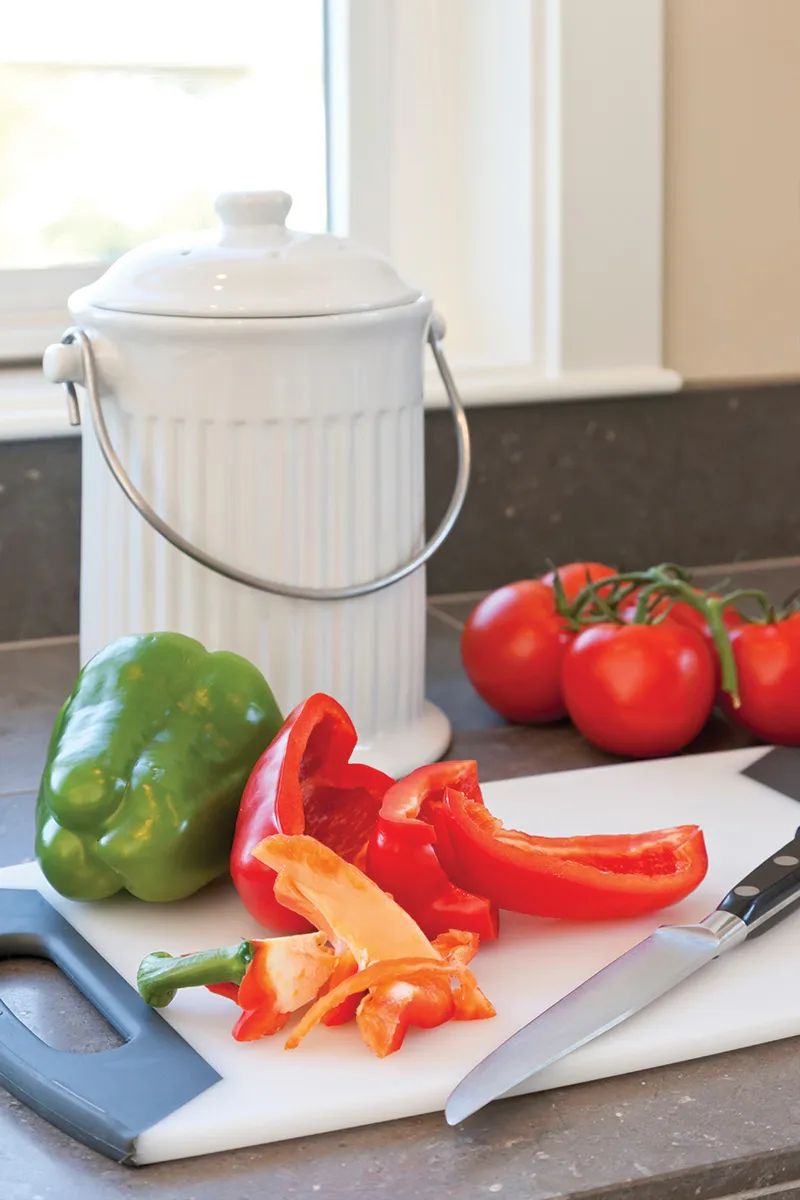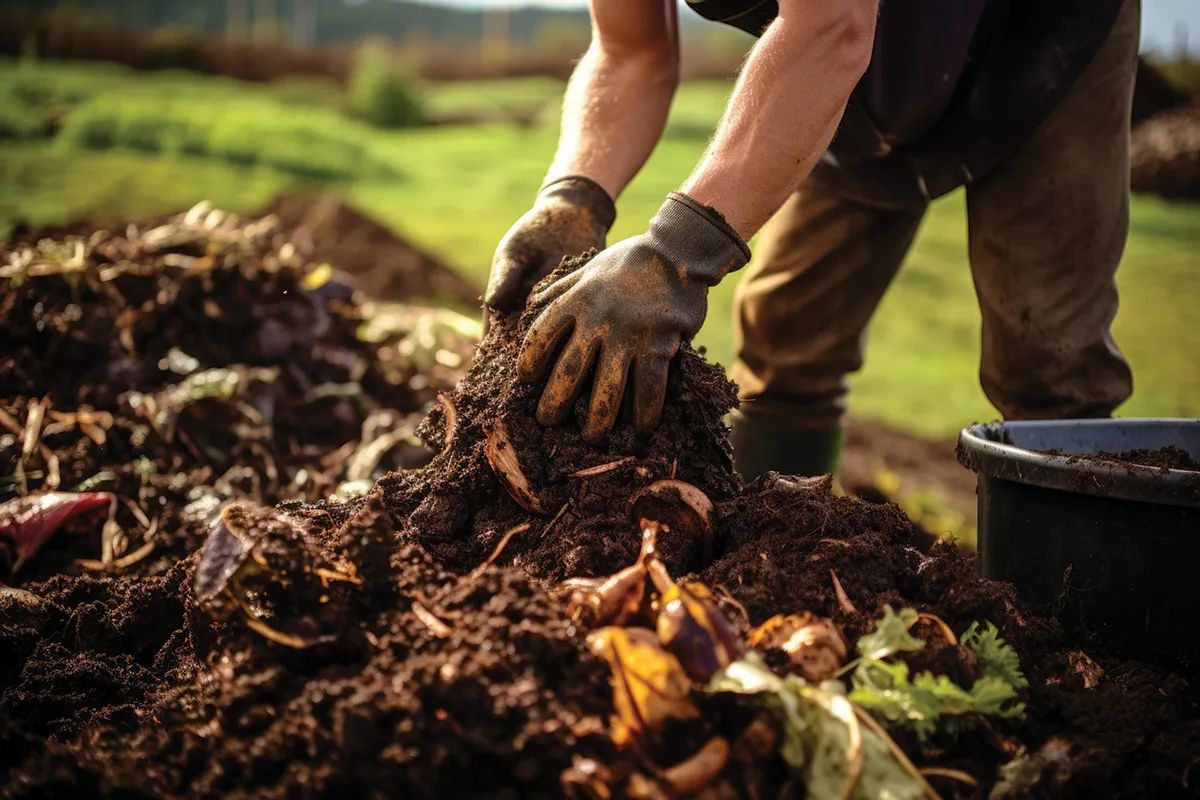
Turning Scraps into Garden Gold
April 2025
Article by Brittany Schimke
It's no secret we can all do better about reducing the amount of waste we produce, especially in our homes. According to the USDA, whether it's leftovers that never get eaten or food scraps that head straight to the trash, the average American family of four loses $1,500 a year to uneaten food. But what if those food scraps could be turned into garden gold? That's where composting comes in.
Starting a family compost bin is an easy and impactful way to reduce food waste, enrich garden soil, and teach kids about sustainability. It also turns kitchen scraps into nutrient-rich compost.
Planning is the first step to reducing food waste and being more mindful about what we buy and how we use it. Start by outlining your meals for the week, not cooking everything ahead of time, but deciding what you'll cook each day for each meal. This helps avoid last-minute takeout and ensures you actually use the ingredients you buy. Get creative with leftovers; consider turning last night's roasted veggies into today's frittata or tossing them into a soup. And don't forget about proper food storage. Keeping fruits and vegetables fresh longer helps prevent that dreaded fridge clean-out.
But even with the best planning, food scraps are inevitable. That's where composting comes in. Instead of tossing carrot peels, apple cores, and broccoli stalks, transform them into something magical: a rich and healthy compost that can boost your home garden's growth.

Getting started and setting up a home composting bin
might sound complicated, but it's not. Start small with a compost scraps bucket in your kitchen for easy access when prepping meals. Once full, transfer the scraps to a larger outdoor compost bin or tumbler. A turning barrel is an excellent option for beginners because it keeps the compost aerated and helps it break down faster. Starting the pile isn't hard, but it can take some time, and tending it will be a labor of love.
Understanding what to compost is key to creating healthy, nutrient-rich soil. Here are some basics.
COMPOSTABLE ITEMS & SIGNS THAT IT'S HEALTHY:
- Fruit and vegetable scraps, think peels, cores, etc.
- Coffee grounds and paper filters
- Tea bags (check for plastic)
- Crushed eggshells
- Grass clippings and leaves, in moderation
- Shredded newspaper and cardboard (plain, non-glossy)
- No pungent smells coming from the pile.
- Having a presence of little bugs wiggling inside your pile.
- Pile is putting off heat, 135-160 degrees.
AVOID THESE IN YOUR COMPOST:
- Meat, dairy, and oily foods attract pests and smell bad
- Pet waste contains harmful bacteria
- Diseased plants can spread disease in your garden
- Treated wood or sawdust because they contain chemicals

Get creative with your setup. Use wire and a few fence posts to make a simple bin or build three connected bins from pallets. The three-bin system lets you start one pile and then move it to the next bin as it breaks down, ensuring you always have compost in progress.
To keep your compost pile healthy, aim for a good mix of "greens," think nitrogen-rich materials like fruit scraps and grass clippings, and "browns," carbon-rich materials like dry leaves and newspaper. "A 30:1 ratio of carbon to nitrogen works best," local expert Bryce Glen, owner of Rocky Mountain Compost, shares. Also, keep your compost moist but not soggy. A good moisture test is to grab a handful of material and squeeze it hard. If water seeps between the fingers, it's too wet. If, after squeezing, you open your hand, and the "ball" falls apart, it's too dry. If the material stays in a "ball," the moisture is just right. Also, don't forget to aerate by turning the pile every couple of weeks.
Composting with kids is fun and educational. It is a fantastic way to teach them about nature, science, and sustainability. Kids naturally love getting messy, so let them help sort scraps, turn the compost barrel, and watch the decomposition process up close. Making it hands-on will keep them engaged, interested, and learning without even knowing.
It can also serve as a great conversation starter for science lessons. Share fun facts about compost, like this one from JB Farley at Agri Organics: "There are about ¼ - ½ a million microorganisms in a dot-sized piece of compost." That means every handful of compost is teeming with microscopic life, breaking down organic material and enriching the soil. Teaching kids about these tiny decomposers is a fun way to introduce them to biology, ecosystems, and the magic of nature's recycling system.
Dark, crumbly, and smelling earthy are signs your compost is ready to use in your garden. Use that wonderful, nutrient-dense compost to top-dress garden beds or potted plants to enrich the soil or mix it into the top layer before planting. "You want a fungal-based compost because that's what the ground wants," JB notes, emphasizing that home compost naturally promotes this ideal balance. Your plants will thrive from the nutrient boost, and your family will enjoy witnessing the magic of turning scraps into garden gold.
Bryce advises beginners to keep it simple, use what's readily available, and don't be afraid to experiment. "Composting mimics the process of nature. We just speed it up," he says. Bryce suggests making composting fun for families by connecting it to where food comes from, like visiting a local farm or garden. It's all about closing the loop and understanding the cycle of life.
If starting a home composting bin isn't the right fit for your family, but you still want your food waste to become compost and not just be added to the landfill pile, consider a local food waste recycling service, Swift Buckets. They offer an easy way to be more sustainable by collecting local homeowners' food scraps and turning them into compost for local gardens and farms.
Start today and turn your trash into treasure. If you have questions along the way, Bryce says, "Most compost operations love to teach, so don't be afraid to ask questions. We're here to help." Composting might seem like a small step, but it makes a big difference. Set up a small compost bin in your kitchen today and watch as your food scraps turn into garden gold!
Local Businesses Making a Difference
Composting isn't just great for home gardeners and families to learn together; it plays a huge role in supporting local agriculture and sustainability. These local businesses are leading the way in reducing waste and enriching our soil right here in our community:
ROCKY MOUNTAIN COMPOST:
Helping farmers, landscapers, and home gardeners improve soil health while keeping waste out of landfills.
AGRI ORGANICS:
Their mission is to reduce landfill waste and create a more circular food system.
SWIFT BUCKETS:
A food waste recycling service making it easy for locals and businesses to divert food scraps from the landfill, turning them into compost that nourishes local farms and gardens.
By supporting these businesses or using their services, you'll help build a more sustainable community, one compost pile at a time!
Originally printed in the April 2025 issue of Simply Local Magazine
Never miss an issue, check out SLM's digital editions here!





